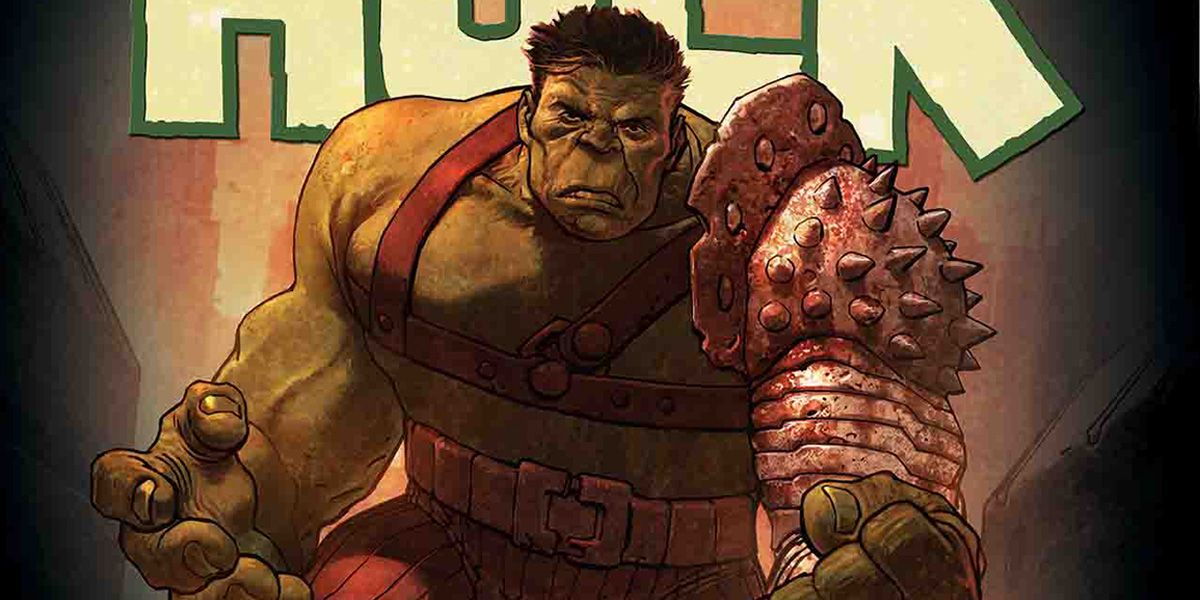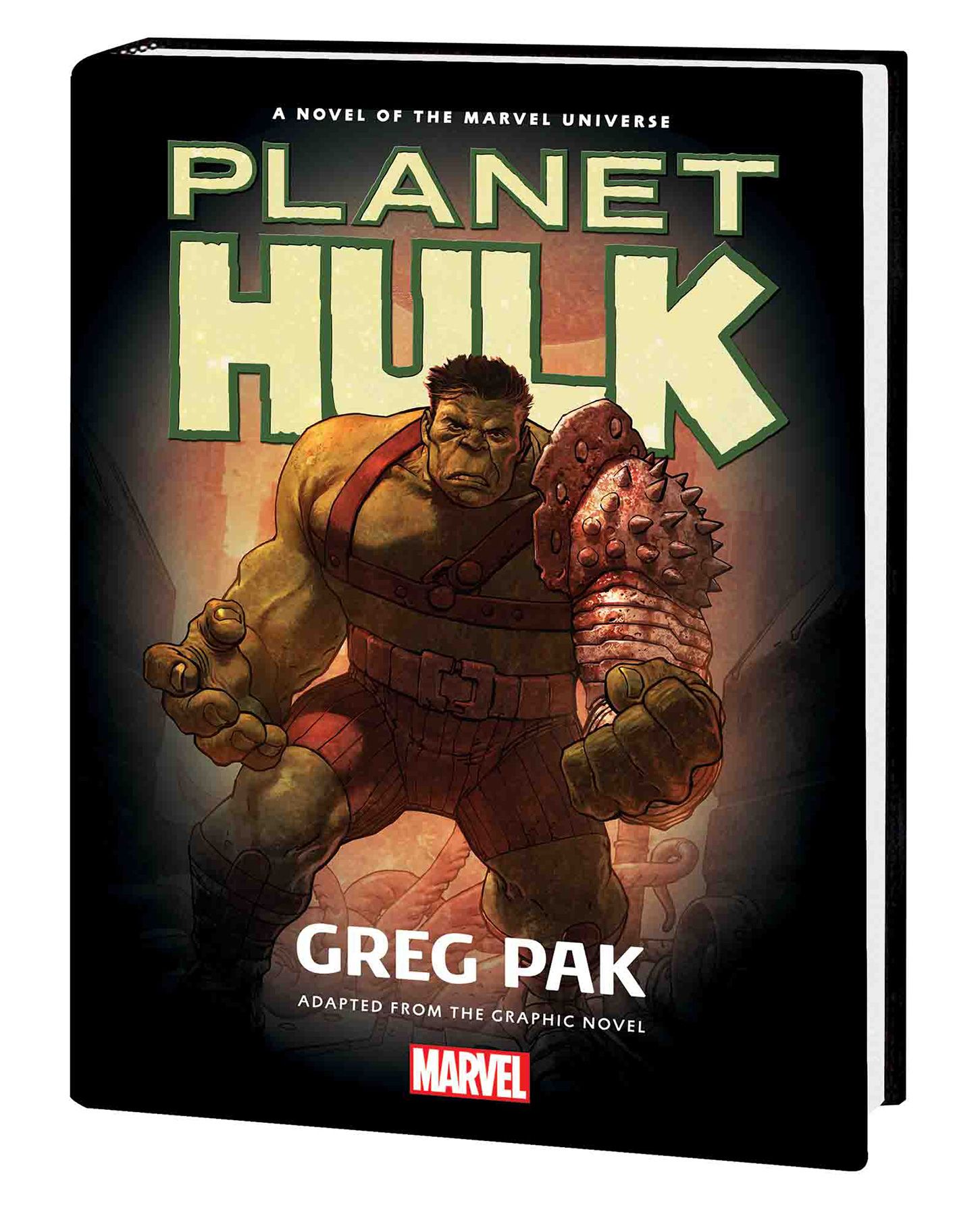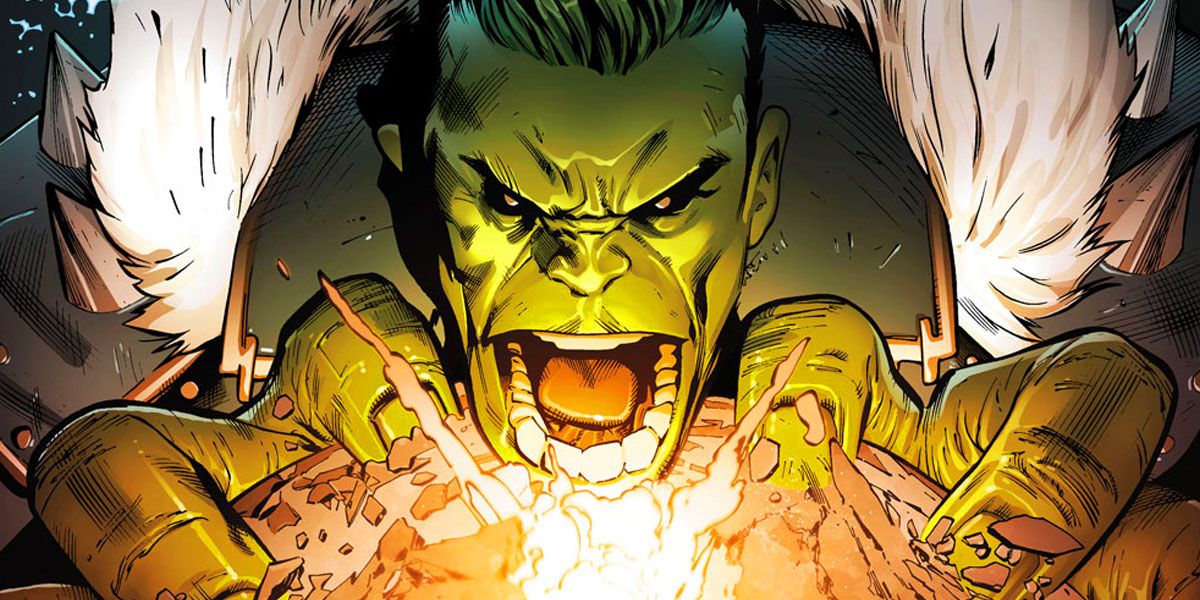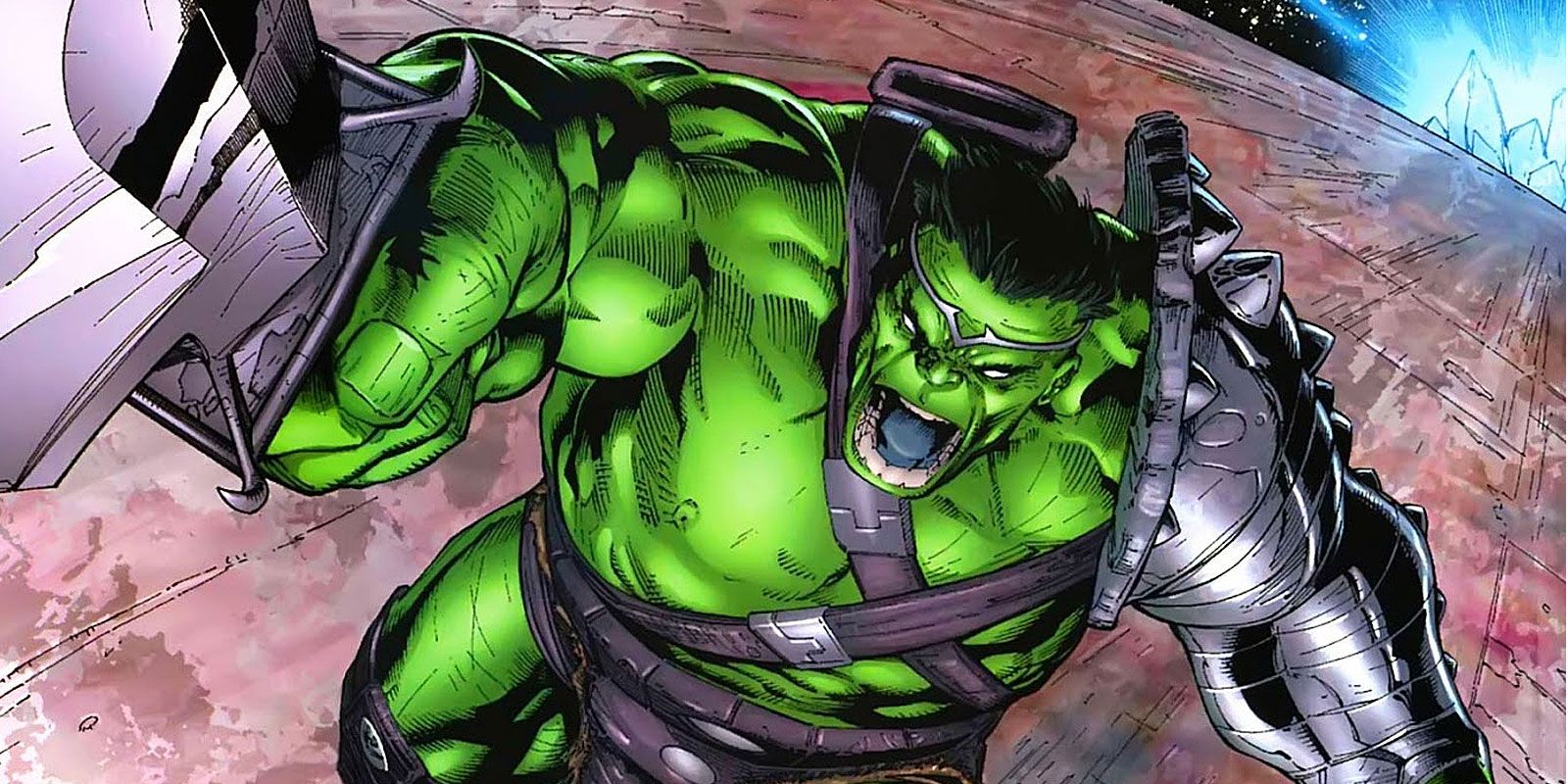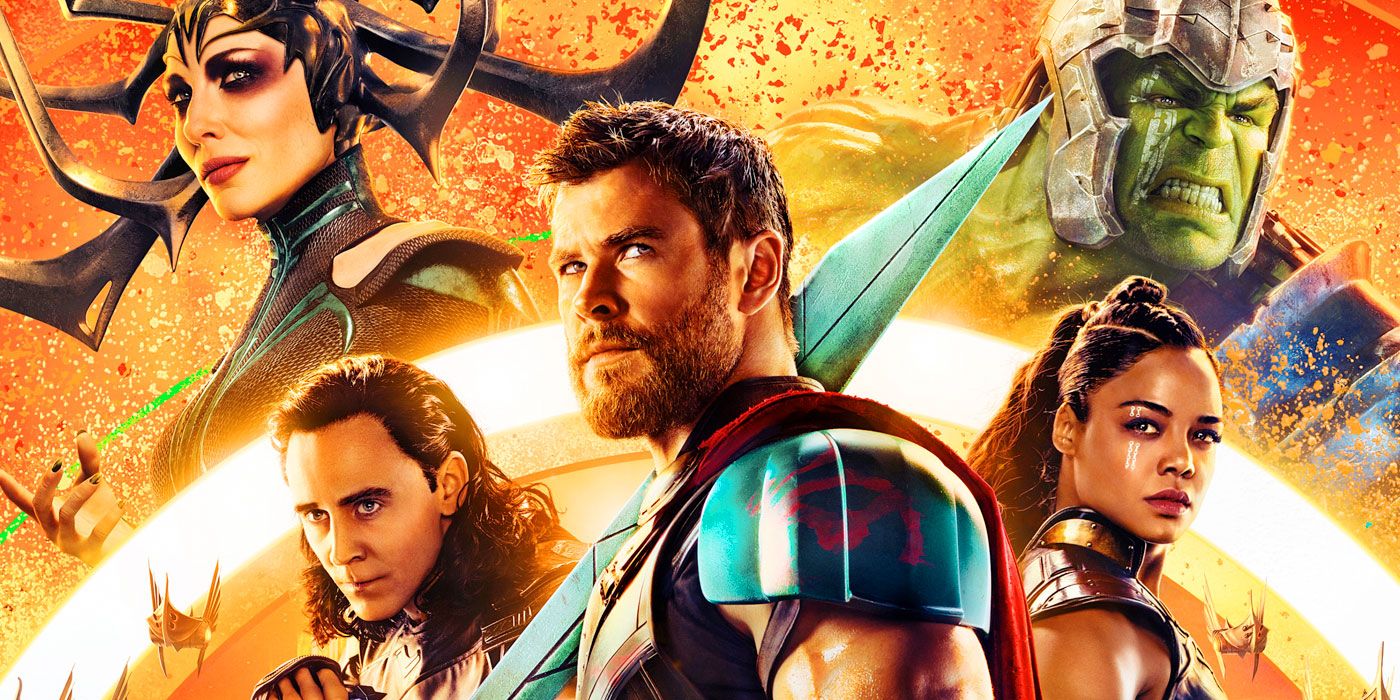How do you solve a problem like the Hulk? For a group of Marvel heroes circa 2006, the answer -- misguided as it was -- to shoot him into space, in order to avoid the inevitable destruction that comes with being a Hulk.
The end result was "Planet Hulk" by writer Greg Pak and artists Carlo Pagulayan and Aaron Lopresti, a 2006-2007 arc that primarily ran through Incredible Hulk #92-#105. In the storyline, the Hulk lands on the planet Sakaar and is made to fight as a gladiator -- making allies like Miek and Kong along the way, and eventually leading an uprising against the planet's ruler, the Red King.
"Planet Hulk" stands as one of the best-received Hulk stories in the character's celebrated history, and one of the pivotal Marvel stories in the modern era. The highest-profile testament to its influence will be seen this November in Marvel Studios' Thor: Ragnarok, where director Taika Waititi has taken both plot and visual inspiration from the storyline -- this time, Thor is held captive on Sakaar, where he encounters the gladiator Hulk, looking like he stepped straight out of the "Planet Hulk" comic books.
Before Thor: Ragnarok, "Planet Hulk" will return to store shelves in early October -- except this time, it's a prose novel from Marvel, adapted by Greg Pak himself as part of the publisher's novel line. CBR spoke with Pak about translated his famed comic book story to a novel, why "Planet Hulk" has endured over the past decade, the experience of writing his first published novel and how it feels to see elements from the story, including Miek and Kong land on the big screen.
CBR: Greg, "Planet Hulk" has inspired What If? stories, action figures, video games, an animated feature, elements of Thor: Ragnarok, and now a prose novel. It's definitely one of the most celebrated stories in your career, and in the modern Hulk canon. What do you think it is about this story that's made it so enduring, and connected with so many people?
Greg Pak: First and foremost, everybody loves the Hulk. The character's so ridiculously well-known and beloved that he's pretty much the world's universal symbol of anger. Everybody gets angry every day at least ten times in this world, but we generally can't explode the way we might like in civil society. So the Hulk is a tremendously powerful fantasy figure -- he typically Hulks out after tremendous provocation and we freaking love it.
What "Planet Hulk" brought to the table was a scenario and world in which Hulk's power and anger were actually virtues. On Earth, the Hulk's anger is just too much -- he's generally seen as a monster. But on the brutal planet Sakaar, the Hulk's anger and power are exactly what the people need to unite the clans and fight the evil Red King. That makes the character's anger righteous, which hugely amps up the vicarious fantasy of the character.
"Planet Hulk" also plays with familiar gladiator and planetary romance story traditions that are spectacularly fun. And it had a great, awful villain and a compelling love story at its core. And we had the space to flesh out a compelling, multidimensional world and build a complex, multidimensional supporting cast. Many times writers are told to make their stories and worlds simpler, to decrease emphasis on supporting players, to focus only on the hero. And sometimes that's the right advice -- fantastical stories in particular can get unwieldy and unfocussed pretty darn fast. But from the beginning, everyone behind the scenes saw that "Planet Hulk" needed room to build its world and supporting cast and we got the pages to do it. Everything ultimately serves the Hulk's huge character arc over the course of the story, but spending the time to build the world and develop every supporting player meant that everything had the chance to get real and deep and emotionally resonant.
But of course everything depends on execution, and we were lucky and blessed to have a tremendous crew of editors and artists working at the top of their game who put everything they had into the book, month after month. I'll always be indebted and grateful to editors Mark Paniccia and Nate Cosby, artists Carlo Pagulayan and Aaron Lopresti, colorist Chris Sotomayor, letterer Randy Gentile, and every other creator who contributed to the series. They all went that extra mile to make the world come to life.
I know this is your first published novel -- you're a comic book writer and a filmmaker, but do you have much prior experience in prose? Is it something you've been looking to explore in your writer-ly career?
I grew up writing prose. Ray Bradbury was my hero, and from the age of about nine onwards I knew I wanted to be a writer. At the time, being a writer to me meant writing prose. I wrote hundreds of pages of short stories throughout my childhood and young adulthood. I even wrote a couple of gloriously ludicrous fantasy novels when I was 12 or 13. But at a certain point in my life, I became focused on dramatic writing -- I went to NYU and studied film and from that point on, most of my writing was screenplays. And then, of course, I moved into comics, so for the last 13 years or so, most of my writing has been comics scripts. But I've always loved prose; it's where I first fell in love with and learned how to write, so diving into the "Planet Hulk" novel was thrilling and kind of strangely comforting all at once. I absolutely loved it and, yes, I'm already working on my next novel.
What was it like bringing "Planet Hulk" to prose? Given how revered the comic book story is, did you have any hesitation in revisiting it?
As soon as my editor Stuart Moore asked if might be interested, I knew I had to do it. The big canvas of "Planet Hulk" just felt just right for a prose novel. I could already feel the language and tone; I immediately sensed that the evocative "Voice of Legend" captions we used in the original storyline would lend themselves gorgeously to prose. And I was absolutely itching to dig deeper into the mindsets of all of the different players in the world. So, no, it wasn't at all a hard creative choice to make -- Stuart had me hooked from the minute I read his email. (Thanks, Stuart!!!)
Page 2: [valnet-url-page page=2 paginated=0 text='How the Planet Hulk Novel Differs From the Comic']
In what ways do you see the story suited for this type of adaptation? Obviously, like any good comic book story, it has a lot of memorable visuals -- what kind of challenge was it bringing it to this medium?
Probably the biggest single challenge was point-of-view. In a comic book or movie script, we're used to changing point of view between characters all the time. In a movie, you can literally cut between different characters' visual points of view twenty times in ten seconds and no one's confused at all. But in prose, you tend to settle into a given character's eyes and you view a scene primarily from his or her perspective. You can absolutely switch that point of view, but it's not generally as rapid-fire as it might be in a movie.
This is not something I'd ever thought about that much. But certain scenes in the comic book play out with significant insights gleaned by different characters at different points in the action. And if you render that scene all from one character's point of view, you might lose some of the nuances of another character's point of view of the same scene. So I needed to learn how to massage and finesse those moments. There aren't hard and fast rules here, but it was something I had to be aware of and Stuart and his team were helpful in pointing out places where I was see-sawing a bit too rapidly from one character's POV to another's.
Speaking of visuals -- there are illustrations throughout the novel, I believe taken directly from the comics. How important was that aspect to you, having the artists who brought Planet Hulk to life represented in the novel?
This was a pleasant surprise -- I didn't have direct input into the layout of the book, so I saw that they'd included art after it was all done. And I love it, of course! Carlo Pagulayan and Aaron Lopresti were the primary artists on the "Planet Hulk" comics, so seeing their line art in the "Planet Hulk" novel is absolutely appropriate and a big thrill.
When a story moves from one medium to another, there are always changes along the way -- as much as you'd like to reveal, in what way does this "Planet Hulk" story differ from the comic book original?
Great question! The main storyline remains the same, with one or two significant exceptions. I won't spoil the biggest difference because I think it'll be most fun for people to discover it for the first time as they read the book. It's a big one, though!
Some of the other changes came about because I had a bit more room to delve into the mindset of different characters. And here and there I had the chance to expand the roles of some characters and even create some new characters. Probably the biggest tweaks along these lines all revolve around getting deeper into the perspective of different characters, which I absolutely loved. It helps flesh out the world, deepen our emotional relationship to these characters, and strengthen and deepen our sense of the Hulk's journey by seeing him through the eyes of these different characters.
If you loved the original "Planet Hulk" comics, I think you're gonna get a huge kick out of the novel. It'll take you deeper and let you relive the adventure in an entirely new way. And if you've never read the graphic novel, I think this'll be a tremendous way to dive into the world and characters. And you don't really need to come into the book knowing anything. We take a little extra time at the beginning to establish the superhero world on Earth, for example, which I think makes the story even more accessible to brand new readers.
"Planet Hulk" is now more than a decade old -- how has your perspective on it changed over the years? When writing the novel, did any new revelations strike you?
It's a little surreal realizing it's been that long -- almost 12 years now since the first issue came out! "Planet Hulk" remains one of the most fun experiences I've ever had working in comics -- and one of the best-received books I've ever had the good fortune to work on. Looking back on the whole thing, one lesson I draw from it is that beautiful things can happen when the right team comes together with the freedom to do something big and loopy. We were given a massive amount of space and freedom to build this story. I'm hugely grateful to the editors who trusted us, opened that door, and shot us into space to do our thing.
Alluded to it earlier, but a lot of Thor: Ragnarok is inspired by "Planet Hulk" -- what's it been like for you to see the visuals of things like Hulk in the gladiator armor or Korg, in live-action?
It's incredible! First I saw that armor and got very excited. Then I saw that behind-the-scenes clip where Taika Waititi mentioned that someone's playing Miek and my head popped off. And then I heard that Korg's in the movie and Waititi's playing him himself! So they're not just using elements from the story we created; they're using some of the original characters and names we created as well! It's a constant thrill. I can't wait to see it!
The hardcover "Planet Hulk" novel is scheduled for release on Oct. 4 with a suggested retail price of $24.99; Thor: Ragnarok is scheduled for release on Nov. 3.

